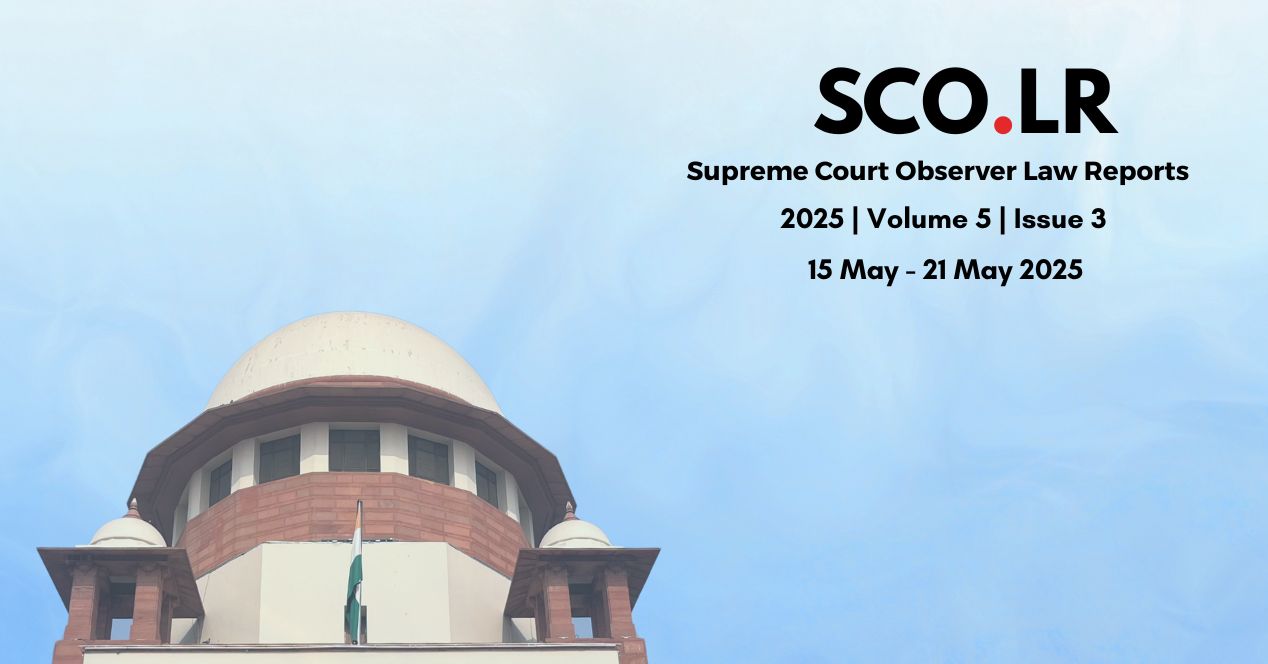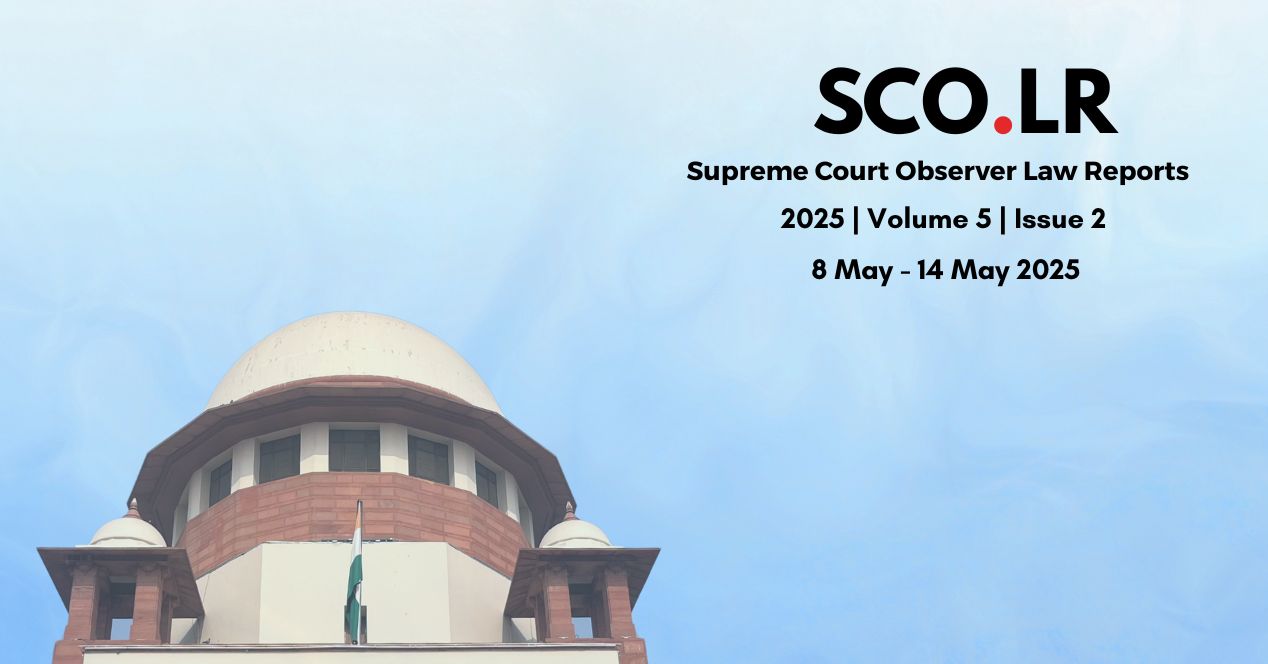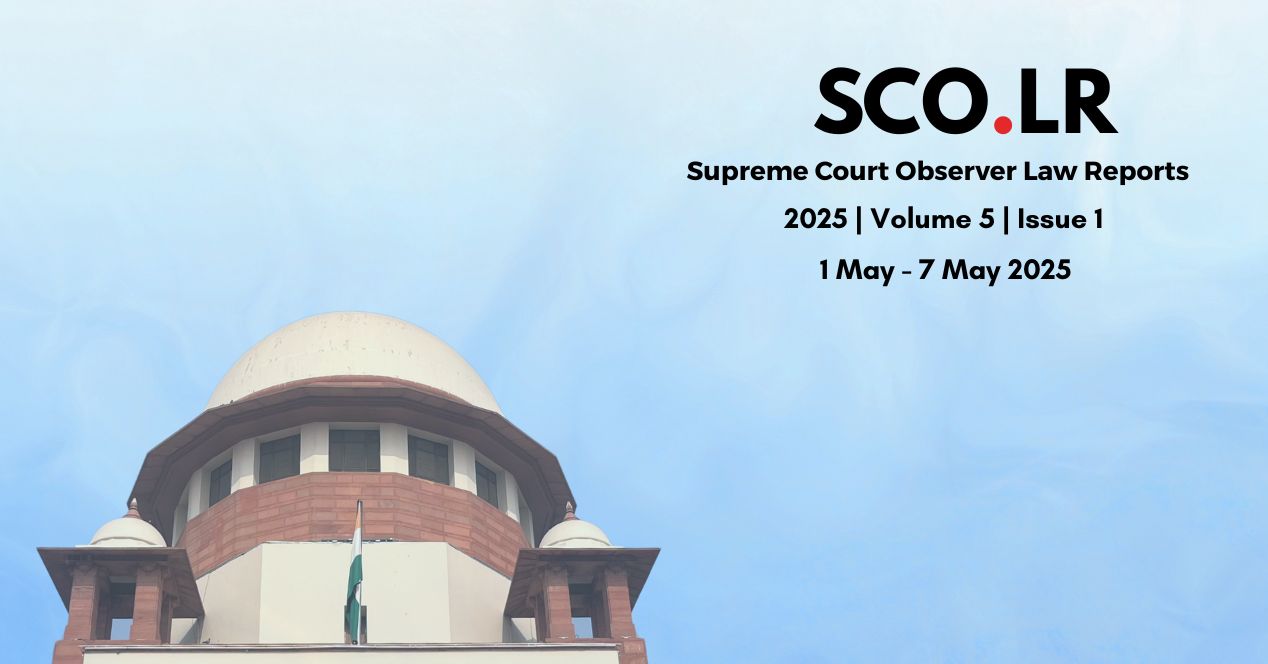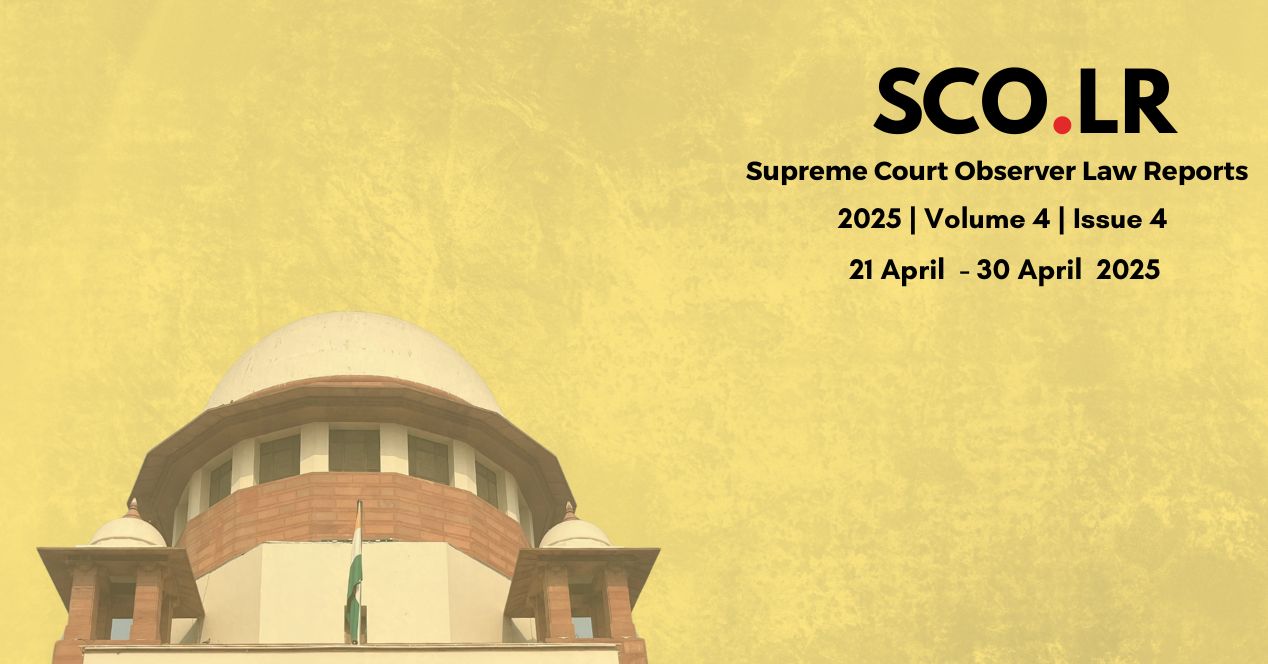Analysis
SCO.LR | 2025 | Volume 5 | Issue 4
In this Issue of SCO.LR, we summarise five significant and unmissable judgements from 22 May to 31 May 2025
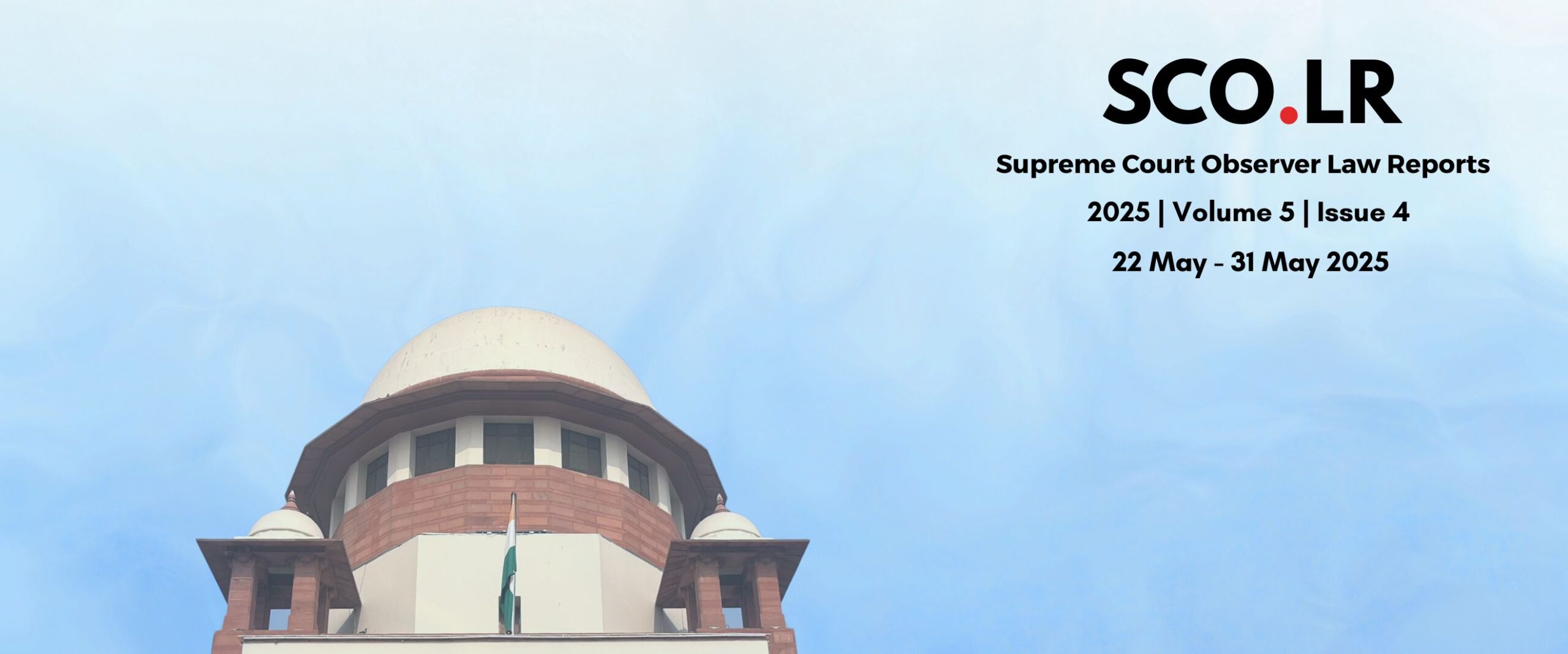
We’re pleased to present Volume 5, Issue 4 of the Supreme Court Observer Law Reports (SCO.LR).
In this edition, we spotlight five significant Supreme Court decisions delivered in the final week of May. The judgements cover a diverse range of issues: the legality of imposing dual taxes on broadcasting services, evolving standards for lawful arrest, the state’s liability in POCSO-related matters, the delicate balance between population control measures and maternity benefits, and the enforcement of PUCL guidelines on police encounters.
All featured decisions are now available in HTML format on our newly launched SCO.LR page. Judgements are organised in reverse chronological order by date of delivery. You’ll also find access to earlier issues and their decisions on the same page.
Explore the latest developments—start reading now.
**********
The Supreme Court Observer Law Reports
2025 SCO.LR | Vol 5 | Issue 4
22 May – 31 2025
**********
Broadcasting services liable to pay both entertainment and service tax
State of Kerala v Asianet Satellite Communication
22 May 2025
Citations: 2025 INSC 757 | 2025 SCO.LR 5(4)[16]
Bench: Justices B.V. Nagarathna and N.K. Singh
The Supreme Court held that direct-to-home (DTH) broadcasting services are not exempt from paying entertainment tax under Entry 62 of the State List merely because they pay service tax to the Central government under Entry 97 of the Union List.
The Court was hearing appeals against 42 judgements from 11 High Courts concerning the issue. The DTH services argued that they are liable to pay only service tax as they only broadcast content through signals. This cannot be construed as “entertainment” under the State List. State governments had argued that the “double aspect theory” allows taxation of DTH providers, as both “service” and “entertainment” taxes are distinct.
The Supreme Court held that broadcasting serves a double purpose—first, the transmission of signals to display content to the subscriber and second, subscribers provide and receive entertainment based on these signals. The content is transferred using signals for entertainment. Therefore, service tax is applicable for the broadcasting activity under the Finance Act, 1994 and the entertainment tax as per the state legislation.
Key words/phrases: Entertainment tax—service tax—both applicable on DTH providers—double aspect theory—service tax as per Finance Act, 1994
Read the Judgement here.
**********
Separate Grounds not Required when Arrest is made with Warrant
Kasireddy Upender Reddy v State of Andhra Pradesh
23 May 2025
Citations: 2025 INSC 768 | 2025 SCO.LR 5(4)[17]
Bench: Justices J.B. Pardiwala and R. Mahadevan
The Supreme Court held that a warrant is adequate to constitute the grounds for arrest. A reading of the warrant to the detained person is sufficient to satisfy the requirement of communicating the grounds of arrest.
The accused’s father filed a writ of habeas corpus at the Andhra Pradesh High Court. He alleged that the CID’s arrest warrant for his son was not meaningful and lacked material information. Therefore, it violated Article 22 of the Constitution and Sections 47 and 48 of the Bharatiya Nagarik Suraksha Sanhita, 2023. The High Court dismissed the writ petition, reasoning that on the face of it, the reasons proved sufficient.
The Supreme Court upheld the High Court’s decision, holding that for the purpose of Article 22(1), full details of the offence are not necessary. The information should be sufficient for the person to understand the reason for the arrest. They reiterated the ratio in Vihaan Kumar v State of Haryana (2025) that informing a person of the reason for arrest was a constitutional mandate. However, unlike in this case, the arresting authority had furnished no warrant in Vihaan.
Key words/phrases: Arrest with warrant—constitutes ground for arrest—reason sufficient under Article 22 of the Constitution—Sections 47 and 48 of the Bharatiya Nagarik Suraksha Sanhita
Read the Judgement here.
**********
Union to form a Committee to increase institutional accountability in POCSO Cases
In Re: Right to Privacy of Adolescents
23 May 2025
Citations: 2025 INSC 778 | 2025 SCO.LR 5(4)[18]
Bench: Justice A.S. Oka and Ujjal Bhuyan
The Supreme Court set aside the sentence awarded to a Protection of Children from Sexual Offences Act, 2012 (POCSO) convict, reasoning that it would cause further injustice to the victim, who was now committed to the convict.
The Bench had previously overturned a Calcutta High Court decision which had indulged in “victim-shaming” while acquitting the accused in a POCSO case. While deciding the sentence to be awarded to the convict, the Supreme Court noted that there had been grave systemic failures, a lack of support from the victim’s parents and an absence of proper legal aid. They noted that the victim had dedicated herself to building a family with the convict and did not perceive the POCSO offence as a crime.
The Court clarified that this decision is not a precedent—it was a response to the failure of State machinery. The Bench directed the State Government of West Bengal to act as her guardian, provide proper shelter and pay for the victim and her child’s education. They directed the Union government to form a committee to implement the suggestions made by the Amicus Curiae to bring about institutional accountability in POCSO cases.
Key words/phrases: Sentencing in POCSO cases—failure of state machinery—lack of legal aid to POCSO victim—convict not sentenced—victim committed to convict and building family—State of Bengal to act as guardian—Union to form committee of experts
Read the Judgement here.
**********
Maternity Benefit Cannot be Denied to Third Child
K. Umadevi v Government of Tamil Nadu & Ors.
23 May 2025
Citations: 2025 INSC 781 | 2025 SCO.LR 5(4)[19]
Bench: Justice A.S. Oka and Ujjal Bhuyan
The Supreme Court held that maternity benefits may not be denied for the claimant’s third child under the Tamil Nadu Fundamental Rules (TNFR).
Umadevi, a government English teacher, had applied for maternity leave for the birth of her third child. The District Chief Educational Officer rejected the application as the TNFR grants maternity leave to employees with less than two surviving children. Umadevi had a third child conceived in a second marriage. A Single Judge Bench of the Madras High Court found the rejection illegal, as she did not have custody of her first two children. A Division Bench held that she was not entitled to maternity leave as per the Rules.
The Supreme Court adopted a purposive interpretation, giving importance to women’s reproductive rights. It held that the object of the Maternity Benefit Act, 1961 was to impose a limit on the duration of leave for more than two pregnancies, not to deny it altogether. It found that the State’s objective of population control must go hand in hand with women’s rights.
Key words/phrases: Madras High Court decision quashed—maternity leave granted for third child—government employee—Tamil Nadu Fundamental Rules—women’s reproductive rights upheld—population control and maternity benefit to be considered harmoniously
Read the Judgement here.
**********
Enforcement of PUCL Guidelines not Contingent on Direct Victim Participation
Arif Md. Yeasin Jwadder v State of Assam
28 May 2025
Citations: 2025 INSC 785 | 2025 SCO.LR 5(4)[20]
Bench: Justice Surya Kant, N.K. Singh
The Supreme Court held that the procedural safeguards laid down in People’s Union for Civil Liberties v State of Maharashtra (2014) for police encounters are binding and must be enforced regardless of whether the victim or their family initiates the complaint.
A Public Interest Litigation (PIL) at the Assam High Court sought an independent investigation into alleged fake encounters in the state. It noted that 80 incidents had resulted in 28 deaths and 48 injuries across the state. The State admitted that 171 police encounters occurred between May 2021 and August 2022, causing 56 deaths and 145 injuries. The High Court dismissed the PIL as premature and vague.
The Supreme Court set aside the High Court order. It directed the Assam Human Rights Commission to conduct an independent inquiry into the allegations. It held that PUCL guidelines (2014) — requiring mandatory FIRs, independent investigation by the CID or other stations, magisterial inquiry for deaths, forensic analysis and informing human rights commissions are not contingent on direct victim participation. Further, encounters resulting in death must be investigated fairly and mere ‘self-defence’ cannot be the only justification.
Key words/phrases: Assam High Court order set aside—extra judicial killings—PUCL guidelines binding—mandatory FIRs—independent investigation—magisterial inquiry—procedural safeguards not victim-dependent—fair probe in encounter deaths
Read the Judgement here.

